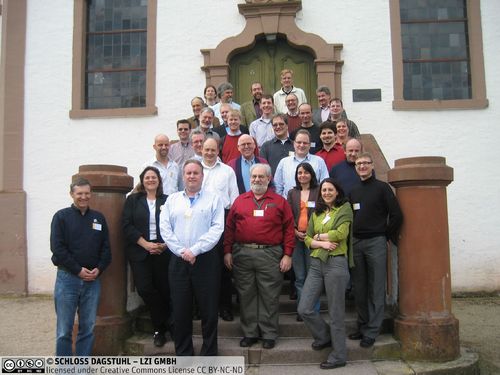Dagstuhl-Seminar 08141
Organic Computing – Controlled Self-organization
( 30. Mar – 04. Apr, 2008 )
Permalink
Organisatoren
- Kirstie Bellman (The Aerospace Corp. - Los Angeles, US)
- Michael G. Hinchey (University of Limerick, IE)
- Christian Müller-Schloer (Leibniz Universität Hannover, DE)
- Hartmut Schmeck (KIT - Karlsruher Institut für Technologie, DE)
- Rolf P. Würtz (Ruhr-Universität Bochum, DE)
Kontakt
Organic Computing (OC) has become a challenging vision for the design of future information processing systems: As they become increasingly powerful, cheaper and smaller, our environment will be filled with collections of autonomous systems equipped with sensors and actuators to be aware of their environment, to communicate, and to organize themselves in order to perform the actions and services that seem to be required. However, due to increasing complexity we will not be able to explicitly design and manage all intelligent components of a digitally enhanced environment in every detail and anticipate every possible configuration. Therefore, our technical systems will have to act more independently, flexibly, and autonomously, i.e., they will have to exhibit life-like properties. We call such systems "organic". Hence, an "Organic Computing System" is a technical system, which adapts dynamically to the current conditions of its environment. It will be self-organizing, self-configuring, self-healing, self-protecting, self-explaining, and context-aware. After the successful initial Dagstuhl Seminar on Organic Computing in January 2006 with its emphasis on "Controlled Emergence" this seminar focused on controlled self-organization (SO). The major objective of the seminar was to explore the question "How can we build useful self-organizing systems?" This was expressed by three main topics for the seminar:
- Basic understanding of self-organization
- Organization of technical SO systems
- Design of SO systems
The seminar was attended by 32 participants with the majority coming from Germany and a strong fraction from the United States. Starting with an extensive introductory session, the seminar was organized as a sequence of couples of short presentations followed by intensive discussions, triggered by the presentations and by explicit questions on their overall topic. This more or less created a sequence of panels. The emphasis on discussions inspired a lively exchange of ideas. The first session on "Distributed self-organizing applications" presented generic distributed architectures (reconfigurable hardware, middleware), and applications like air traffic control (with highly strict security and safety requirements) and smart camera systems.
More general talks were presented on Generic Organic Computing architectures and wrappings as a form of test environment for complex systems. It became clear, that the application of self-organizing systems is not confined to toy applications. Rather, they are required to be built around legacy systems to keep these under control.This requirement is particularly strong in hardware design. The need for learning at design time and runtime was emphasized. There are significant commonalities between complex hardware and software systems. Self-organized scheduling for the parallelization of optimization procedures was a new example for this. Thursday afternoon was devoted to working groups.
As a direction for future applications multi-application test-beds were envisioned that would make rapidly changing objectives tractable. This will probably be robot playgrounds and surveillance scenarios. The talks of the seminar clearly demonstrated a range of applications where principles of OC have been used successfully. But, definitely, there is an urgent need for more investigations on how we can find adequate methods for managing the complexity of self-adaptive and self-organizing systems. The demand is obvious, and good partial solutions are already there.
- Michael Beigl (TU Braunschweig, DE) [dblp]
- Kirstie Bellman (The Aerospace Corp. - Los Angeles, US) [dblp]
- Andreas Bernauer (Universität Tübingen, DE)
- Uwe Brinkschulte (KIT - Karlsruhe, DE)
- Rainer Buchty (KIT - Karlsruher Institut für Technologie, DE)
- Giovanna Di Marzo Serugendo (University of London, GB) [dblp]
- Peter Dittrich (Universität Jena, DE) [dblp]
- Falko Dressler (Universität Erlangen-Nürnberg, DE) [dblp]
- Sándor Fekete (TU Braunschweig, DE) [dblp]
- Michael Grottke (Universität Erlangen-Nürnberg, DE) [dblp]
- Jörg Hähner (Leibniz Universität Hannover, DE) [dblp]
- Andreas Herkersdorf (TU München, DE) [dblp]
- Michael G. Hinchey (University of Limerick, IE) [dblp]
- Christian Igel (Ruhr-Universität Bochum, DE) [dblp]
- Wolfgang Karl (KIT - Karlsruher Institut für Technologie, DE) [dblp]
- Robert Laddaga (BBN Technologies - Cambridge, US)
- Falk Langhammer (Living Pages Research GmbH - München, DE)
- Peter A. Lindsay (The University of Queensland - Brisbane, AU)
- Paul Lukowicz (Universität Passau, DE) [dblp]
- Erik Maehle (Universität Lübeck, DE) [dblp]
- Sanaz Mostaghim (KIT - Karlsruher Institut für Technologie, DE) [dblp]
- Gero Mühl (TU Berlin, DE)
- Phyllis R. Nelson (Cal Poly - Pomona, US)
- Franz J. Rammig (C-LAB - Paderborn, DE)
- Paul Robertson (BBN Technologies - Cambridge, US)
- Hartmut Schmeck (KIT - Karlsruher Institut für Technologie, DE) [dblp]
- Jürgen Teich (Universität Erlangen-Nürnberg, DE) [dblp]
- Jochen Triesch (Goethe-Universität Frankfurt am Main, DE) [dblp]
- Wolfgang Trumler (Universität Augsburg, DE)
- Theo Ungerer (Universität Augsburg, DE) [dblp]
- Klaus Waldschmidt (Universität Frankfurt, DE)
- Rolf P. Würtz (Ruhr-Universität Bochum, DE)
Verwandte Seminare
Klassifikation
- artificial intelligence / robotics
- modelling / simulation
- mobile computing
- networks
- semantics / specification / formal methods
- soft computing / evol. algorithms
Schlagworte
- organic computing
- self-organisation
- design
- adaptivity


